Financial Advisor -SEO Case Study From 400 to 30,000 a Month

Overview
From 400 a month to 32,000 Organic Traffic a Month (7000% increase in traffic).
From 400 a month to 32,000 Organic Traffic a Month (7000% increase in traffic).
Huge increase in national leads (Both Pension & Equity Release)
Only 1 content writer
A small link-building budget of less than £500 per month
A long-established small to medium sized Financial advisor company that wanted to generate leads in the UK Pension and Retirement Planning industry.
The vast majority of the traffic was for Penison Advice /Retirement Planning related search terms.
Around 12 months into the campaign we decided to generate national leads for equity release on top of pension and retirement planning.
The domain did not have a single existing piece of content or even mention the word equity release.
I was able to replicate the exact same content strategy I used for pension & retirement planning to generate national leads for equity release.
I was able to to outrank some of biggest equity release companies in the UK for huge lead gen search terms in both Pension & Equity Release.
The traffic is still growing I believe it could hit 30-50k users a month without any further work.
Within this case study I'm simply saying what worked for me, this is by no means a how to guide to do SEO. In fact, if I was to do it again, I'd do things differently.
Its worth noting that this was all achieved with just myself and one single content writer who was following my content briefs.
Whilst we kept to a decent pace, things may have been achieved much quicker and at a far larger scale with a team of writers.

Challenges
- Only branded traffic (No existing google traffic outside of brand name)
- Severe Lack of content
- Google SERPS dominated by authority sites
- Low domain authority (DR 8 Ahrefs)
- Failing Google all core websites
- Only 1 content writer
Resources That Have Helped My Strategy
- SEO Avalanche Theory Ranking With No Resources ( A excellent forum thread which explains how to build up traffic without links, really helped me in terms of gamifying the objective and creating targets. Although I didn't directly follow the strategy, I did indirectly follow concept of gaining trust through content using easier to rank queries)
- Craig Campbell's Private SEO mastermind and SEO Youtube Channel (Craig offers great learning resources for people of all levels in SEO from beginner right up to high-level SEO, and a tell-it-like-it-is approach to SEO)
- Charles Floate’s SEO Courses and Youtube Channel ( I've purchased most of Charles's courses and picked up so much information, in particular on link building).
- Kyle Roof (His approach to science-driven white hat SEO. There are loads of free videos on youtube, as well as his testing library and IMG courses. If you haven't watched his legendary ranking with lorem Ipsum video it's worth a watch).
Tools Used
- Google Search Console
- Ahrefs
- Screaming Frog
- Surfer SEO
- Inlinks
- Hunterio
- Keyword Cupid
- Keyword.com
Website Rebuild
GT Metrics was reporting 14-second load times and we were failing every core web vital score on mobile so my first task was to fix the extremely slow, almost broken website.
I made this a priority, not because of the SEO benefit but mainly for the conversion rate boost from existing brand traffic the domain was receiving.
I teamed up with experienced web developer stebell.co.uk and we set about trying to improve load times.
After a couple of days, we realised that due to a bloated theme and poor development, there was no amount of speed optimisation that could really get the domain to where it needed to be.
It would actual be much quicker to rebuild the site.
So we opted to rebuild the website from scratch. All the existing design was kept. A replica of the site was just rebuilt with a clean HTML.
To put the cherry on top with added Nitropack Plug-in to shift all page speed and Core web vital scores into the green.
This gave us a good base to start adding content….
Initial Content Audit
None of the existing content on the website received any search traffic (5-10 non-branded clicks a month at most).
Nearly all of the existing organic traffic was branded traffic to the home page.
Therefore it was clear that a content plan needed to be in place.
All existing content on the website was typical company-style generic blog posts, such as…
Top 5 Tips for x
Meet the team
Top 10 Reasons for x
7 Steps to …
The content was basically all brand-driven short-form blog content, In this instance, the content wasn't created with SEO in mind, it was still well-written readable content, it just didn't serve a purpose for SEO.
Seeing as though it was bringing in no traffic to the website, and was misaligned with any search specific intent, I decided to completely remove most of the content from the google search index.
Why?
Because having a lot of pages in the google search index which in googles eyes is “low value”, is probably not a good idea.
What does this say about the domain as a whole?
With any remaining blog posts, I left how they were and I inserted an internal link up to my target ‘money pages’ (more on this later).
Having hundreds of pages/posts which bring in zero traffic is a common theme I see over and over when auditing websites.
Mini Side Rant…
It's common to see a company solely writing generic non-search-specific blog articles because they have been told to do so for SEO, or worse SEO agencies delivering this as part of their SEO strategy.
In my opinion, SEO content, whether it is for BOF, MOF, TOF or Hybrid Brand/Service content should still be capable of non-branded delivering traffic on its own, and bringing new users to your website, who are not familiar with your brand name.
After all, that's what SEO is about.
Delivering traffic, and generating leads and revenue.
Under performing search content tends to happen when the content writers are left to their own devices and have not been given SEO briefs.
This results in content that is not centred around any sort of focal search queries.
As a result, the content will not rank for any search terms and bring traffic to the website.
If you are unsure what Keywords or search queries your content is ranking for you can head to the Google search console.
Find the individual page you want to check, and click queries.
Note: Content should also be given time to age. Not all queries are shown In search console.
If the content has been given time to age and you are seeing your brand name or brand + keyword bringing in the vast majority of the page traffic /or very few clicks outside of your brand name.
Or even worse no clicks at all…
Then there's a good chance the content is not optimised for any specific search query and/or is not ranking high enough in the search engine to generate any traffic.
Content production without proper SEO briefs in place can also bring other problems to an SEO campaign.
Keyword cannibalisation can also become an issue.
Theoretical example…
7 Steps to an Early Retirement
5 Top Tips to Retire Early
Planning an Early Retirement
Is Early Retirement Right For Me?
Can I retire early?
The problem with each of the above, Is they are likely all fighting for the same search intent (as a result they are could potentially cannibalisation issues.
Note: Its common for "seo & digital marketing agencies" to deliver content each month as a deliverable, that does very little to support your SEO. Its worth studying your search console account to see what your content is doing.
Questions you should be asking your seo agency..
How does the content they are producing support your overall seo strategy?
Is your content generating traffic?
Are your main service pages/Intent driven search pages increasing in traffic?
Has your non branded traffic increased?
Keyword Research, SERP Analysis, Topical Authority & Winning Snippets
Note: The content strategy you choose should be based upon your own niche and SERP rankings factors. What google likes for each individual niche and SERP (Search engine results pages) will change, and therefore it's important to do your own research.
SERP Analysis
Whilst it might have been virtually impossible for our domain to compete for some of the main money keywords such as “pension advice”. There was so much opportunity elsewhere.
In this particular niche (Pensions), there are so many question orientated topics. This is common in most niches, people want to research before purchasing or getting in touch.
In this case, the SERPs (Search engine results) were dominated by high authority sites (typically large companies with big marketing budgets).
Authority comes in many forms but to name a few, Age, Brand, Content (Topical), and Links authority.
In this instance, by high authority, I'm mainly referring to route domain authority generated by link building.
Most large companies will naturally acquire links to their homepage due to marketing campaigns and large budgets.
However, since the SERPS was dominated by these kind of sites, this also offered a huge opportunity.
A lot of large companies have terrible on-page SEO.
It's so common to see extremely thin content, default unoptimised meta titles, and poor internal linking amongst the bigger companies.
They will be happy to sit bottom of page one for a huge money keyword, but are blissfully unaware of how much traffic, leads and revenue they could by throwing away with a few simple fixes.
The difference in traffic between positions 7-10 and position 1 is huge!
Anyway…
I realised I could gate crash page one by…
Having better more in-depth content than what was out there.
Winning snippets (Jumping to position zero by optimising my answer for snippets)
Covering the subject area for more angles and covering different search intents (Topical Authority).
Some Strategic Internal Linking.
Keyword Research
I’d love to say there was a particular tool I used to give me a content plan, but there isn't. Most of my keyword research was spent inside Google, looking at the SERPs.
One of my favourite techniques is to do the following
Head to google and search various modifiers in front and at the end of my keywords.
Keyword/Topic + Best
What + Keyword
If + Keyword/Topic
How + Keyword/Topic
Can I + Keyword/Topic
Is + Keyoword/Topic
There are a lot of combinations and there is a lot of cross over intent but, hopefully get the point...

Other techniques often used for a keyword were looking at people also ask a section of google for ideas. In terms of tools, the only tools I sued were (Answer the Public, Keyword Chef, and Ahrefs).
However, the vast majority of my keyword research was a manual SERP analysis using the keyword +modifier technique explained above.
This keyword research technique is explained here by Steve Toth
This a ridiculously easy way to find low competition query's to go after.
Tip: If forum pages are ranking in the SERPS its generally a sign of weakness and could be an easy to win position.
Once you are generating traffic for a query in your niche you are also gaining trust for that subject area (this ties into SEO avalanche theory mentioned earlier on in this write up)
I often explore the SERPS looking at different angles for content, If I find a query that might be worth targeting Il add it into my google doc.
Sometimes ending up with hundreds of search queries on a page.
I would then group related queries together and make a decision on which would be my head query for each page.
For example, there will be many crossovers between different search keywords.
I then had to make a decision on which keywords were in fact the same search intent, which keywords belonged as the main query keyword and which were secondary questions that belonged on a page as part of a larger topic.
A great tool for deciding which keywords/Headings belong on a page and how your content should be interlinked or clustered is Keyword Cupid.
Finding Gems
Once I found a query I wanted a target, I used Ahrefs keyword explorer to try and gain a greater understanding of the link profiles supporting a sites rankings.
In the UK Financial services niche I would typically see the same high DR 'authority sites' sites popping up in the SERPS. Money Helper, Which, Compare the Market, Aviva, Legal and General, Age Uk, Pension Bee.
However, occasionally I would see lower DR (domain rating) sites ranking highly.
I was more interested in what these lower DR sites were doing to achieve high positions.
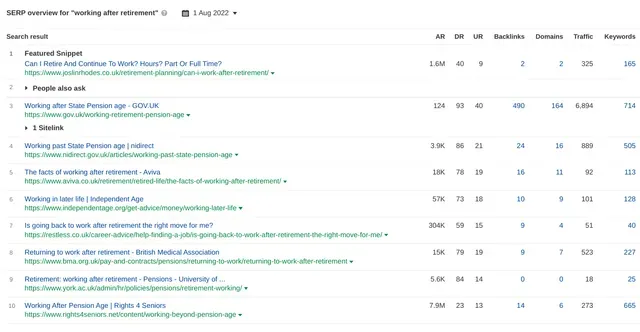
Did they have higher quality content?
More content coverage across the domain ?
Did they have referring domains pointing to that particular page?
How were they internal linking?
How had they structured their content?
I was more interested in these ranking factors as these were things I could more easily replicate.
Once I found a site a site, I would head over to view its 'Top Pages'. This would give me an overview of which pages are bringing traffic to the domain.
This is a great way of finding content topics that I may not have covered.
I'd note them down and add it to my spreadsheet.
Topical Authority
Topical authority' formed a big part of the whole content strategy.
Google loves sites that are topically relevant to subject areas and demonstrate expertise.
You can demonstrate expertise by covering different search queries and contexts around your subject area.
For example...
If you want to rank a high intent lead gen page for “Equity Release Calculator”
Then you should cover related search topics. Here’s an small example...
Equity Release Interest Rates
Is equity release a scam?
Does equity release reduce inheritance tax?
Do you pay tax on equity release?
How long does the equity release process take?
Equity release vs remortgaging?
Types of equity release schemes
What is a life time mortgage?
Topical Authority essentially means covering your topic in depth, covering different search intent.

Whilst a lot of the SERPS was dominated by high authority sites (referring domains) such as PensionBee.com, Gov.Uk, Ageuk.org.uk, and Moneyhelper.org.uk.
I could jump above these sites and straight position zero by winning the featured snippets.
Since this particular niche is heavy question-orientated there were a lot of content and snippet opportunities.
In order to optimise for snippets I structured my content in a certain way, however, if I didn't win the main query snippet then there's a good chance my content would rank a page in the organic SERPs or win many secondary snippets.
I narrowed down on questions, often structuring an entire piece of content around that question. I would then make sure to answer the user's main question very early on in the content.
This meant the user did not have to scroll at all on mobile to find their answer.
This is really the opposite approach to newspaper/editorial style content which is designed to keep the user on the page. Google wants to give the user the answer to the question.
Tip: Snippets should be under 300 characters,to the point with zero fluff. Bolding the snippet and placing it inside a stand-alone paragraph cant help it stand out to google.
I'm effectively telling google here is the answer to your question.
The writer was told to use to sound authoritative (think wikipedia) and to use short easily digestible sentences in an NLP frinedly formt.
The rest of the document was dedicated to showing our expertise in the subject area and breaking down the question in more detail.
This often meant using, data, tables, images, and videos, to demonstrate expertise on the topic.
Tip: Google can read the text in images, I would often create an image which includes a quote from my content and a semantic keyword relevant to my content.
Further down in the post I could also answer any other related questions to the topic, these would be structured as headings and present snippet opportunities.
We started to win multiple snippets per blog post, even when we're not trying to win the snippets.
A lot of this was likely down to having 'topical authority' by having a lot of content coverage and covering many different angles as our domain was being trusted by google in the subject area.
We structure answers to questions in a specific way, and this played into googles NLP (Natural Language Processing) algorithm.
This article by Briggsby.com 'On Page SEO for NLP. Provides an excellent resource for content writers and SEO's.
I can summarise the article into the following..
- Reduce dependency hops between words (Make it simple for google to understand and don't beat around the busy when answering questions)
- Avoid Unclear Antecedents. 'The folder was on the bus, but now it’s gone. Which is gone? Is it the bus or the folder?'
- Follow the Query Through. Google does not want the user to have to make 2 or 3 more searches (If a user searches for 'working after retirement' then you should answer questions such as.. How many hours can I work?, Can I take my pension and still work? Can I claim my lump sum and still work?
Once the content writer had finished the first draft I would put the content through NLP content optimisation tools such as Inlinks and Surfer SEO. Any missing topics were weaved into the content.
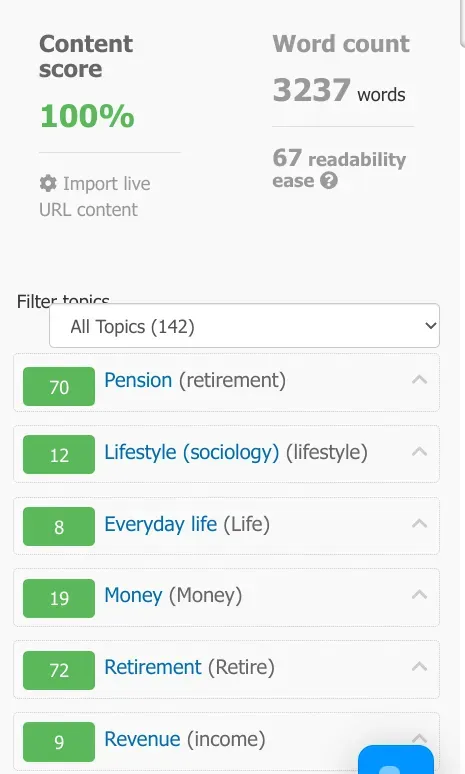
Internal Linking
Utilising your domain's own authority is incredibly easy to do and a lot of sites are missing out on traffic through non-existent or poor internal linking.
You can literally shift a page up the SERP results within days by pushing internal links with relevant anchors.
I generally broke my content down into the following...
Money Pages (Content I wanted to rank because they are high purchase commercial intent queries).
Support Pages (Content which was designed to push authority to my money pages through internal links, while also ranking for its own queries and bringing in its own traffic).
In this niche, lot of our 'support content' would be classed as Top of the funnel / Middle of the funnel.
However, there we're a lot of cases where a page was created just for topical coverage.
This would often mean the content has virtually no chance of converting and doesn't seem closely related to the companies main service.
However it was deemed that the content was necessary based on Google's understanding of the topic.

When internal linking we prioritised pages that we're higher converting and in more competitive SERP's.
Not ever single page was perfectly crafted for internal linking, but there was heavy thought given to internal linking using some of the virtual silo internal linking method mentioned in this video by Kyle Roof
In general, I did the following..
1. Pages I wanted to rank received more internal links.
2. Content which was highly relevant to one another linked together (obviously).
3. Internal links pointed at; 'money pages’ were placed higher up in the content.
4. I linked 'sideways' to support/informational content, to help rank the support content..
5. I tried to limited the number of internal links from support content. I tried not to link here there and everywhere, instead internal links were placed strategically to other support content pieces to ‘power them up'.
6. When internal linking, thought was given to which anchor text I was using. I did not want to internally link over and over with the same anchors. Instead, I used a mixed anchor text to pass relevancy for other semantically relevant terms to the page.
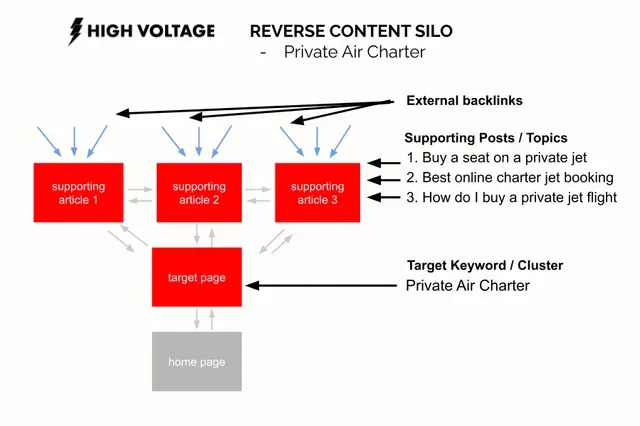
Local Search for Financial Adivsor Keywords
To help generate some local traffic I optimised our google my business page for search terms.
This helped us appear in the google 3 pack on mobile search.
The 3 pack tends to appear when people are doing a search for a local service such as...
service keyword+ location
or
Service keyword
We also made a focus on generating reviews.
(In truth ranking a local business in the 3 pack is a whole different topic for a different post).
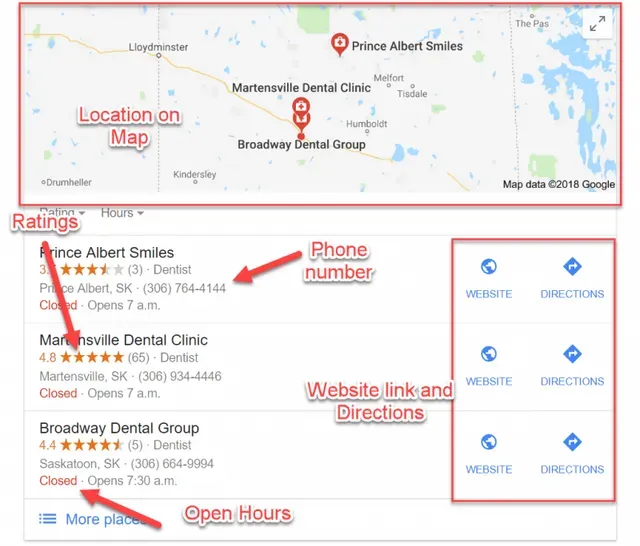
Another local strategy we used for quick traffic wins, was setting up local pages such as...~
domain.com/service-location
We even managed to rank for
"financial advisor + city" in a neighbouring city at position #5.
This was a little more difficult. As financial advisor + city was a somewhat competitive SERP.
To help give us the best chance of ranking I put up a bunch of content about the neighbouring city and internally linked back to our location page.
The Q & A style content would answer things like, best shops, best bike ride locations etc.
The aim was to generate some form of topical authority around the city. I cant say for sure how much this helped the page rank but it could do no harm.
I then built guest post links, niche edits and citations to the page.
Link Building
We made link-building a priority throughout the campaign. I wanted to build route domain authority by receiving links from other high authority domains, and backlinks to our support pages to help pass power through to our ‘money pages or target pages’.
To do this I utilised the following…
- Guest posts to the home page and internal pages.
- Niche edits/link inserts to support content
- Citations to location pages
- Tiered link building (linking to our links)
- Digital PR
- Press Release (Content published across high authority sites & Google News approved domains)
Link Building Method 1 Expert round-ups
To do this, I scraped the SERPs for blog sites in our industry and any potential side niches. I then used Hunter.io to find their email addresses.
In this case, we found a side niche community of FIRE, (Financial Independence and Retire Early).
I set up email campaigns, with follow-ups targeting each blogger asking them t contribute to our expert round-up post in return for a free link.
Once we published the post I would email each blogger and them to share their mention with their followers. (You’d be surprised how often they will link back to your post).
A relatively easy way of acquiring links and referral traffic.
Tip: After a while I then 301 redirected the expert round-up all with relevant anchors to our hub page 🤭.
Link Building Method 2 - Passive Link Building using Statistic Pages
I found this technique after watching Stacey MacNaught's interview on a Authority hacker's youtube channel.
The technique basically revolves around compiling industry statistics on a page and ranking that page for search terms such as.
“keyword +stats”
“keyword + statistics UK”
Journalists love to use stats in their content, If your content is that the top of google for these queries, the likelihood is that a journalist will use your content and link back to you as a source. (giving you a high DR link from a national newspaper).
We tried this method on this particular domain and it did not work. Not every method outreach/link building method will work first time and I'm fine with that.
This did not work pension stats/retirement are particularly hard to rank for. I could have maybe spent more time trying to do this, but for whatever reason I did not.
However, I have used this technique with excellent success on another domain to attract links from high authority sites such as the Sun, The Telegraph and GQ Magazine 📈 . This is a fantastic method for acquiring links on autopilot that should work in a lot of niches.
Link Building Method 3 - Guest Post Outreach (Side Niches)
Whilst people in your industry might be reluctant to allow you to guest post on their site.
There may be other opportunities elsewhere.
In one particular instance, I had a blog post on “Equity Release Tax”.
Again, I scraped the SERPs and used Ahrefs to find UK accountancy sites that were bringing in a lot of traffic for tax-based queries.
To find these sites I simply searched for tax based questions and looked for sites who were publishing content and using SEO to rank topics.
I then offered to write a guest post on equity release tax and link back to my own article.
This was an easy way of getting a super relevant link from a site that google trusts on the topic.
My article would then link up to my ‘money page’ or ‘high intent page’.
I also landed linked on authority sites such as fool.co.uk see below
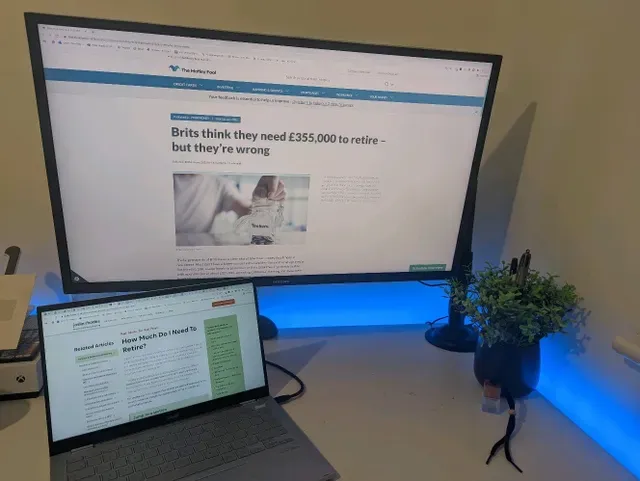
Link Building Method 4- Niche Relevant Forum Link Building
There are a lot of old (but highly used) forums in this space.
I would head to the forums, find questions about my topics and link to my own articles.
This proved to be a great way of generating referral traffic from our links.
Link Building Method 4- Niche Relevant Forum Link Building
There are a lot of old (but highly used) forums in this space.
I would head to the forums, find questions about my topics and link to my own articles.
This proved to be a great way of generating referral traffic from our links.
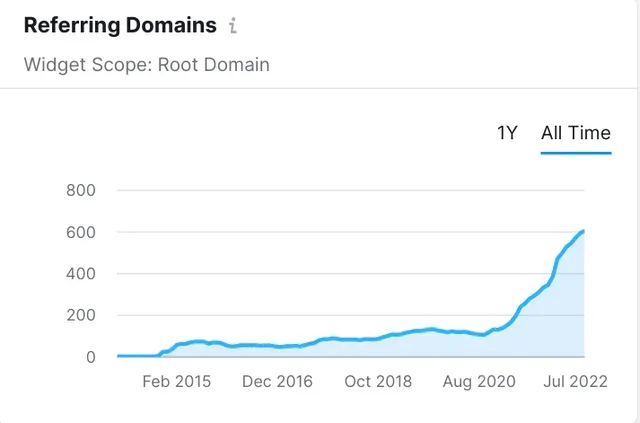
Author Profiles (For EAT- Expertise Authority and Trust)
To play into Google's potential EAT ranking factors ( I say otnential becayse I still belive EAT is largley based on Links. But anyway, I did the following...
- Consolidated most articles to one author.
- Inserted an author profile section at the bottom of every page.
- Inserted schema markup showing the author.
- Created author profiles on social media and IMDB which linked back to my domain.
Jump Link Tables
I inserted a jump link table into every page of content. This makes it super easy for users to jump to the section that's relevant to them. An excellent feedback signal to google.
I opted to place the jump link table roughly 2 paragraphs into the article. This allowed us to insert the featured snippet answer higher up.
Maxamizing Conversions For Finanical Adivsors With Facebook Re-targeting Pixels
In order to maximise conversions (which in this case were phone calls and form fills). I set up a re-targeting pixel. So that we could advertise our previous web traffic on social media with relevant ads.
This effectively offered them a second bite at the cherry and another opportunity to connect with your brand and convert.
You can also niche down on re-targeting. For example, only targeting users who visited certain pages, or met certain demographic criteria.
For this I opted to use Facebook's conversion campaign setting. This allows you to set the action that you want Facebook to consider as a conversion.
Overtime Facebook will be able to optimise your ads and show them to people who are most likely to take this action.
Summary
- Create content that satisfies search intent.
- When structuring a blog post around a question, the first few paragraphs are important (Google wants to satisfy search intent - give the user the answer)
- Win featured snippets by targeting questions.
- Don't be afraid of high of trying to outrank high authority domains (Most have terrible on page SEO)
- Don't just publish content for the sake of it. Do your best to create the best possible article in the SERPS, ranking content has a snowball effect.
- Be strategic with internal linking (Have some sort of hierarchy).
- Cover topics in depth and cover different contexts.
- Link building is crucial in some niches, don't ignore it.
- Use the SERPS to dictate your content length, style and structure.
- Re-target web traffic to maximise conversions.

